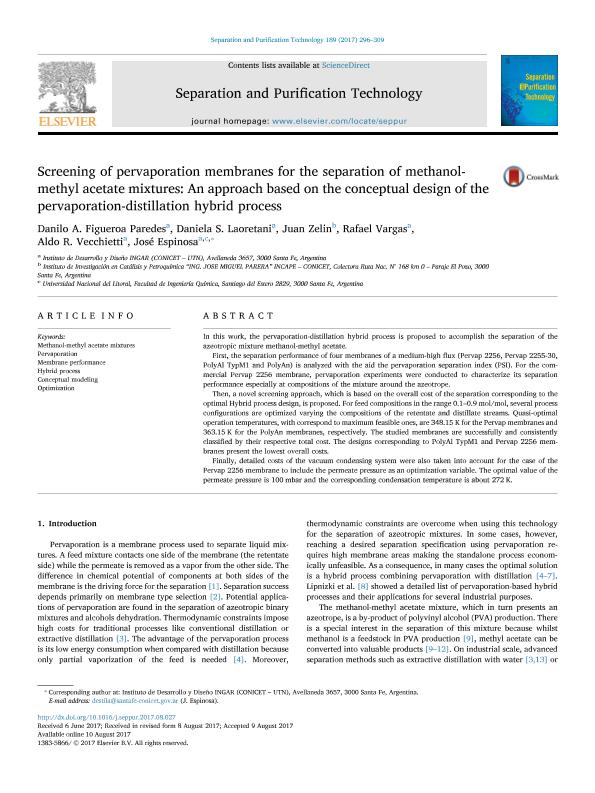Mostrar el registro sencillo del ítem
dc.contributor.author
Figueroa Paredes, Danilo Alexander

dc.contributor.author
Laoretani, Daniela Soledad

dc.contributor.author
Zelin, Juan

dc.contributor.author
Vargas, Rafael Roque Alejandro

dc.contributor.author
Vecchietti, Aldo

dc.contributor.author
Espinosa, Hector Jose Maria

dc.date.available
2018-11-01T18:06:04Z
dc.date.issued
2017-12
dc.identifier.citation
Figueroa Paredes, Danilo Alexander; Laoretani, Daniela Soledad; Zelin, Juan; Vargas, Rafael Roque Alejandro; Vecchietti, Aldo; et al.; Screening of pervaporation membranes for the separation of methanol-methyl acetate mixtures: An approach based on the conceptual design of the pervaporation-distillation hybrid process; Elsevier Science; Separation and Purification Technology; 189; 12-2017; 296-309
dc.identifier.issn
1383-5866
dc.identifier.uri
http://hdl.handle.net/11336/63463
dc.description.abstract
In this work, the pervaporation-distillation hybrid process is proposed to accomplish the separation of the azeotropic mixture methanol-methyl acetate.First, the separation performance of four membranes of a medium-high flux (Pervap 2256, Pervap 2255-30, PolyAl TypM1 and PolyAn) is analyzed with the aid the pervaporation separation index (PSI). For the commercial Pervap 2256 membrane, pervaporation experiments were conducted to characterize its separation performance especially at compositions of the mixture around the azeotrope.Then, a novel screening approach, which is based on the overall cost of the separation corresponding to the optimal Hybrid process design, is proposed. For feed compositions in the range 0.1?0.9 mol/mol, several process configurations are optimized varying the compositions of the retentate and distillate streams. Quasi-optimal operation temperatures, with correspond to maximum feasible ones, are 348.15 K for the Pervap membranes and 363.15 K for the PolyAn membranes, respectively. The studied membranes are successfully and consistently classified by their respective total cost. The designs corresponding to PolyAl TypM1 and Pervap 2256 membranes present the lowest overall costs.Finally, detailed costs of the vacuum condensing system were also taken into account for the case of the Pervap 2256 membrane to include the permeate pressure as an optimization variable. The optimal value of the permeate pressure is 100 mbar and the corresponding condensation temperature is about 272 K.
dc.format
application/pdf
dc.language.iso
eng
dc.publisher
Elsevier Science

dc.rights
info:eu-repo/semantics/openAccess
dc.rights.uri
https://creativecommons.org/licenses/by-nc-sa/2.5/ar/
dc.subject
Methanol-Methyl Acetate Mixtures
dc.subject
Pervaporation
dc.subject
Membrane Performance
dc.subject
Hybrid Process
dc.subject
Conceptual Modeling
dc.subject
Optimization
dc.subject.classification
Otras Ingeniería Química

dc.subject.classification
Ingeniería Química

dc.subject.classification
INGENIERÍAS Y TECNOLOGÍAS

dc.title
Screening of pervaporation membranes for the separation of methanol-methyl acetate mixtures: An approach based on the conceptual design of the pervaporation-distillation hybrid process
dc.type
info:eu-repo/semantics/article
dc.type
info:ar-repo/semantics/artículo
dc.type
info:eu-repo/semantics/publishedVersion
dc.date.updated
2018-10-23T17:53:24Z
dc.journal.volume
189
dc.journal.pagination
296-309
dc.journal.pais
Países Bajos

dc.journal.ciudad
Amsterdam
dc.description.fil
Fil: Figueroa Paredes, Danilo Alexander. Consejo Nacional de Investigaciones Científicas y Técnicas. Centro Científico Tecnológico Conicet - Santa Fe. Instituto de Desarrollo y Diseño. Universidad Tecnológica Nacional. Facultad Regional Santa Fe. Instituto de Desarrollo y Diseño; Argentina
dc.description.fil
Fil: Laoretani, Daniela Soledad. Consejo Nacional de Investigaciones Científicas y Técnicas. Centro Científico Tecnológico Conicet - Santa Fe. Instituto de Desarrollo y Diseño. Universidad Tecnológica Nacional. Facultad Regional Santa Fe. Instituto de Desarrollo y Diseño; Argentina
dc.description.fil
Fil: Zelin, Juan. Consejo Nacional de Investigaciones Científicas y Técnicas. Centro Científico Tecnológico Conicet - Santa Fe. Instituto de Investigaciones en Catálisis y Petroquímica ; Argentina
dc.description.fil
Fil: Vargas, Rafael Roque Alejandro. Consejo Nacional de Investigaciones Científicas y Técnicas. Centro Científico Tecnológico Conicet - Santa Fe. Instituto de Desarrollo y Diseño. Universidad Tecnológica Nacional. Facultad Regional Santa Fe. Instituto de Desarrollo y Diseño; Argentina
dc.description.fil
Fil: Vecchietti, Aldo. Consejo Nacional de Investigaciones Científicas y Técnicas. Centro Científico Tecnológico Conicet - Santa Fe. Instituto de Desarrollo y Diseño. Universidad Tecnológica Nacional. Facultad Regional Santa Fe. Instituto de Desarrollo y Diseño; Argentina
dc.description.fil
Fil: Espinosa, Hector Jose Maria. Consejo Nacional de Investigaciones Científicas y Técnicas. Centro Científico Tecnológico Conicet - Santa Fe. Instituto de Desarrollo y Diseño. Universidad Tecnológica Nacional. Facultad Regional Santa Fe. Instituto de Desarrollo y Diseño; Argentina
dc.journal.title
Separation and Purification Technology

dc.relation.alternativeid
info:eu-repo/semantics/altIdentifier/url/http://linkinghub.elsevier.com/retrieve/pii/S1383586617318002
dc.relation.alternativeid
info:eu-repo/semantics/altIdentifier/doi/http://dx.doi.org/10.1016/j.seppur.2017.08.027
Archivos asociados
